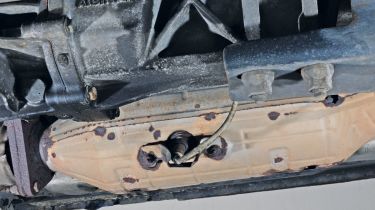Britain’s catalytic converter theft epidemic is nearly over
Exclusive Auto Express data has revealed that catalytic converter thefts fell by an average of 98 per cent over the past three years – but criminals are now targeting EV cables

Catalytic converter theft may soon be a thing of the past, as exclusive new Auto Express data has lifted the lid on its dramatic decline – raising the question as to why this might be the case, and what thieves are now opting to steal instead.
Following a Freedom of Information request to all 48 police constabularies across the UK, Auto Express can reveal that in 2024, the number of catalytic converter thefts fell by 98 per cent on average compared with 2021. A total of 30 forces provided a sufficient response to be included in our findings.
A prime example of how significantly thefts have decreased is in South Yorkshire, which in 2021 recorded 850 incidents of theft registered under the term ‘catalytic converter’. In 2024, however, only five crimes of this kind were recorded, representing a huge 99.4 per cent fall.
Other forces also saw significant drops in the number of thefts; the number registered by Humberside Police, for example, dipped by 84.4 per cent from 192 in 2021 to 30 in 2024.
How cat thefts have fallen year by year
| Year | 2019 | 2020 | 2021 | 2022 | 2023 | 2024 |
| Total thefts across 30 forces | 3008 | 5331 | 6909 | 5442 | 1991 | 150 |
Reacting to Auto Express’ findings, Assistant Chief Constable of the National Police Chiefs Council (NPCC), Sarah Grahame, said: “Police forces across the country have been working with partner agencies over recent years to tackle the issue of catalytic converter thefts, and I am pleased that these efforts have resulted in a reduction in this criminality.”
Grahame explained that several preventative measures have been implemented by police, including the creation of a database to register and track stolen catalytic converters, as well as the usage of forensic marking to help catch those responsible.
However, police efforts aren’t the only factor behind the decline; the wholesale price of rhodium – one of the precious metals thieves target from catalytic converters – hit a 10-year high in 2021, but has slowly fallen since.
Nevertheless, the price of rhodium is still greater now than it was in the early part of 2020, and catalytic converter thefts continue to fall – indicating there has been some shift away from the crime.
Criminality obviously hasn’t disappeared, however, so what are thieves now choosing to take instead? It would appear that one target could be EV charger cables, as the number of incidents of cable cutting has exploded by 400 per cent in the last year, with criminals attempting to retrieve the valuable copper inside.
Charging firm InstaVolt has recently turned to hiring private security and even fitting GPS trackers to its cables in order to deter theft. CEO Delvin Lane admitted: “Cable theft is a growing challenge for our industry, threatening the confidence of EV drivers and undermining investment in charging infrastructure.”
Besides its lucrative nature, one of the main incentives behind this type of theft is the low conviction rate. Grahame pointed out: “Like other types of acquisitive crime, investigators can face difficulties in identifying suspects and obtaining evidence, which can make seeking prosecutions difficult. We know that preventative policing can be the most effective way to stop these types of crimes occurring in the first place.”
Did you know you can sell your car through Auto Express? We’ll help you get a great price and find a great deal on a new car, too.









